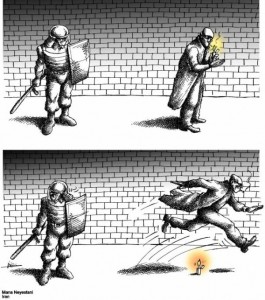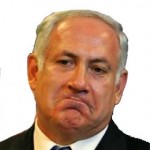
2100 GMT: Chahrshanbeh Suri.
An activist reports a conversation with a relative in Gisha in Tehranm, who said basiji were roaming the streets on their bikes and tried to stop people celebrating. Told of a report that said nothing political had happened tonight, the relative answered, "In Iran everything is political."
2010 GMT: Political Prisoner Watch. More temporary releases --- Behzad Nabavi, a leader of the Mojahedin of Islamic Revolution Party serving a five-year term for "crimes against national security", and journalist and economist Saeed Laylaz
have been freed until 4 April. Laylaz posted $500,000 bail.
NEW Iran Document: Mousavi Speech on “Patience and Resistance” (15 March)
NEW Latest Iran Video: The Attack on Karroubi’s House (14 March)
Iran Breaking: Ban on Reformist Political Party
Your Super-Special Iran Caption Contest
Iran: The Opposition’s Campaign in the US — Sequel With Revelations and A Lesson
The Latest from Iran (15 March): Breaking Human Rights
2000 GMT: Chahrshanbeh Suri
Reza Sayah of CNN reports, via a Tehran witness, that police are spray painting passing cars that toss firecrackers out of windows. Basiji used tasers and batons to chase away 300 partiers near Mehr Park in Farmanieh.
1840 GMT: Justice. We had asked a couple of days what Tehran Prosecutor Abbas Jafari Doulatabadi was doing in Qom with marjas (senior clerics).
Here's one answer: Grand Ayatollah Safi Golpayegani told Doulatabadi to try the culprits of Kahrizak Prison's abuses as soon as possible, "so that the people feel the judiciary can act freely". Criticising advisors such as Presidential Chief of Staff Esfandiar Rahim-Mashai, Safi Golpayegani advised Doulatabadi to "treat the people kindly and fairly... [for] if Islamic principle is shattered, the whole system is gone".
1830 GMT: Larijani Pushing for Nuclear Deal? Looks like Speaker of Parliament Ali Larijani is
putting out a signal that he wants the "West" to come back to the table on uranium enrichment talks:
Iran's parliament (Majlis) speaker Ali Larijani advises the West to pursue a diplomatic approach in resolving their differences with Tehran on the issue of its nuclear program. Speaking at a press conference in Tehran Tuesday, Larijani reiterated that the US, France, Britain and Germany have sought to delay the supplying of fuel to Iran for Tehran's research reactor through "mischievous" acts.
"They eventually came to the understanding that Iran is only willing to act according to the [International Atomic] agency's framework; so they abandoned the 'carrot and stick' approach, only to resort to sanctions," he added.em>
1825 GMT: There is a lot of chatter about clashes in Tehran. We are holding off on reports pending confirmation. A rumour spread of a fire at the house of Mehdi Karroubi's son Hossein is false.
1819 GMT: Political Prisoner Watch. Saeed Jalalifar, a member of the Committee of Human Rights Reporters,
has been released on $100,000 bail. Jalalifar, a student at Zanjan University, was arrested on 30 November.
Azar Mansouri of the Islamic Iran Participation Front
has been released from prison for a period of twenty days.
1815 GMT: Unconfirmed reports
of clashes in Karaj.
1800 GMT: Back from an extended academic break. Thanks to readers for updating on the events of Chahrshanbeh Suri.
CNN's Reza Sayah
is reporting, from a witness, "Light traffic on major roads. Parties in side streets with music and dancing. Police patrol major roads and squares but allowing parties along side streets. No reports of clashes."
Another activist reports, "Aryashahr (in Tehran) is just like a war zone, sound of fireworks is constant and security forces have pulled out of the area for now."
1345 GMT: We have posted, courtesy of the Los Angeles Times,
the English text of Mir Hossein Mousavi's speech to the Islamic Iran Participation Front on "a year of patience and resistance".
1325 GMT: An Arrest Within the Regime. The son of senior Revolutionary Guards commander Esmail Gha’ani
has been arrested, according to
Green Voices of Freedom. Ali Gha’ani is an electrical engineering student at the Islamic Azad University of Mashhad. GVF speculates that, as the younger Gha'ani has no experience of political activity, the arrest is due to his father’s criticism of Government action after the June election.
1310 GMT: Today's Cyber-Propaganda. Press TV
offers the platform:
After a 30-member US-backed cyber network was dismantled in Iran, members of the Parliament (Majlis) have praised efforts to bust one of the main gangs and cyber networks in the country.
[Editor's note: Is it my imagination or did Press TV just rename the Islamic
Revolution Guards Corps?]
"The joyful news about the arrest and dismantling of one of the biggest and main groups of cyber networks backed by the Central Intelligence Agency (CIA), which worked to gather information, once again disclosed another conspiracy against the Islamic Republic," said 220 parliamentarians in a letter to the Islamic Republic Guards Corps (IRGC).
1210 GMT: Iran's Threat to Britain (and Its Students). The Foreign Ministry has issued a warning this morning that it will be
reducing its links with Britain, specifically by restricting the movement of Iranian students to the United Kingdom.
1200 GMT: The Mousavi Message. Two notes about Mir Hossein Mousavi's speech (see 0655 GMT), made to the Islamic Iran Participation Front, calling for "a year of patience and resistance".
First, note our revised translation, based on an EA correspondent, with "resistance" replacing "endurance". That is a much stronger message of opposition,
Second, Mousavi's timing and language is a blatant attempt to pre-empt the Supreme Leader, whose Nowruz (Iranian New Year) message will call for "a year of...."
Although it is the Karroubi statement that is getting more attention outside Iran today, Mousavi's message --- in connection with the banning of the IIPF --- may have more resonance inside the country.
1045 GMT: Karroubi Watch. Maybe it's the definition of "irony" or just a crafty campaign: only days after an opposition PR move by "a senior aide" to Mehdi Karroubi fell flat in the US, the Western media are rushing to feature the cleric. First it was Sunday's attack on his house, now it is Karroubi's statement (see 0645 GMT) denouncing the despotism of the Iranian Government.
0945 GMT: The IRGC Gets A Contact --- Correction. Yesterday we reported that the engineering firm connected with the Revolutionary Guards just received an $850,000 oil pipeline contract. A reader noted, "The Revolutionary Guard would never settle for such a paltry amount!"
He's right. It's $850 million.
0725 GMT: Winning the Compromise. The Parliament and President Ahmadinejad may have reached an immediate resolution of next year's budget, with Ahmadinejad getting $20 billion of the $40 billion he wanted from subsidy reductions, but the political battle continues. The
pro-Larijani Khabar Online pronounces, "The Government Discreetly Withdraws from Executing Subsidy Plan".
0723 GMT: Production assistant Mehdi Pourmousavi, who was arrested in the raid of director Jafar Panahi's house,
has been released. Panahi is still detained.
0720 GMT: Watching the Crackdown.
Satirist Ebrahim Nabavi's latest --- "I arrest, therefore I am!"
0710 GMT: Endure (cont.). Ahmad Batebi's website posts
a statement from Human Rights Activists in Iran on the regime's crackdown and accusations of "cyber-war".
0655 GMT: Endure. Rah-e-Sabz has
a lengthy report of Mir Hossein Mousavi's speech to members of the banned Islamic Iran Participation Front. The takeaway line: "1389 (the forthcoming Iranian year) is the year of our patience and endurance".
0645 GMT: Karroubi Watch. We've posted
the video of the attack on Mehdi Karroubi's house on Sunday.
The cleric is undaunted, however. In a meeting with students of his party, Etemade Melli, he emphasised that
the elections were "unnatural" and that they confirmed "there will be no more real elections in Iran." Karroubi asserted, "This government doesn't rely on people's votes....The Islamic Republic has been struck by dictatorship, only her name remains.
0620 GMT: Today is Chahrshanbeh Suri, the Fire Festival on the eve of the Iranian New Year. It will be an occasion for street celebrations, though it is unclear whether these will take on a political tone. While there has been a great deal of chatter outside Iran about use of the occasion, there have been few signs that the movement within will seek a mass protest.
Perhaps more pertinent is whether the regime politicises the event through ill-considered attempts to condemn the festival. The Supreme Leader has already risked po-faced overreaction with his denunciation of a ceremony without religious roots or value.
Meanwhile, the big political event may be the banning of Iran's largest reformist political party, the Islamic Iran Participation Front. We began tracking the development yesterday afternoon and have posted a separate entry. Given the regime has declared that it has already overcome the post-election crisis, this seems a curious move. Why risk a provocation that further exposes the lack of political freedom in Iran and could bring open conflict?
More arrests to balance the regime's strategy of releasing detainees on bail if they keep their silence. Only Democracy For Iran has a summary of political prisoners in Babol in northern Iran. The head of Mir-Hossein Mousavi’s election campaign, Alireza Shahiri, and Ali Akbar Soroush, a university professor and member of the Islamic Iran participation Front, have been arrested. Student activists Mohsen Barzegar, Iman Sadighi, and Mohammad Esmailzadeh have been moved to solitary confinement.
 Wednesday, March 17, 2010 at 0:01
Wednesday, March 17, 2010 at 0:01  Josh Shahryar writes for EA:
Josh Shahryar writes for EA:


